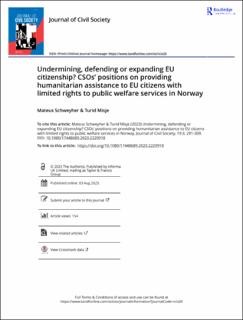| dc.contributor.author | Schweyher, Mateus | |
| dc.contributor.author | Misje, Turid | |
| dc.date.accessioned | 2023-10-30T13:58:55Z | |
| dc.date.available | 2023-10-30T13:58:55Z | |
| dc.date.created | 2023-10-02T14:10:33Z | |
| dc.date.issued | 2023 | |
| dc.identifier.citation | Journal of Civil Society. 2023, 19 (3), 291-309. | en_US |
| dc.identifier.issn | 1744-8689 | |
| dc.identifier.uri | https://hdl.handle.net/11250/3099483 | |
| dc.description | This is an Open Access article distributed under the terms of the Creative Commons Attribution-NonCommercial-NoDerivatives License(http://creativecommons.org/licenses/by-nc-nd/4.0/), which permits non-commercial re-use, distribution, and reproduction in anymedium, provided the original work is properly cited, and is not altered, transformed, or built upon in any way. The terms on which this article has been published allow the posting of the Accepted Manuscript in a repository by the author(s) or with their consent. | en_US |
| dc.description.abstract | This article explores the positions of Civil Society Organizations (CSOs) on providing humanitarian assistance to European Union (EU) citizens with limited rights to public welfare services in Norway through 19 interviews with leaders of humanitarian services run by CSOs in Oslo. The article shows a contradictory picture. On one side, leaders expressed awareness and concern regarding risks associated with the provision of humanitarian services in a country with a comprehensive and ambitious welfare state. These include creating parallel welfare services based on charity rather than rights, and that such services may hide structural violence, or give it a humane façade, thus potentially contributing to the legitimacy and preservation of exclusionary welfare policies and practices. On the other side, service leaders were sceptical towards granting all EU citizens equal access to public welfare benefits and services and reported advocating for the expansion of humanitarian services rather than inclusionary rights for all EU citizens in Norway. We suggest that this may indicate an acceptance of the EU’s principle of conditionality of welfare support on employment history, and a limited willingness or capacity of CSOs to engage in advocacy that could contribute to alternative narratives about EU citizenship and challenge structural exclusion. | en_US |
| dc.language.iso | eng | en_US |
| dc.publisher | Routledge | en_US |
| dc.rights | Attribution-NonCommercial-NoDerivatives 4.0 Internasjonal | * |
| dc.rights.uri | http://creativecommons.org/licenses/by-nc-nd/4.0/deed.no | * |
| dc.subject | migration to Norway | en_US |
| dc.subject | EU citizenship | en_US |
| dc.subject | advocacy | en_US |
| dc.subject | humanitarianism | en_US |
| dc.subject | civil society organizations | en_US |
| dc.title | Undermining, defending or expanding EU citizenship? CSOs’ positions on providing humanitarian assistance to EU citizens with limited rights to public welfare services in Norway | en_US |
| dc.type | Peer reviewed | en_US |
| dc.type | Journal article | en_US |
| dc.description.version | publishedVersion | en_US |
| dc.rights.holder | © 2023 The Author(s). Published by Informa UK Limited, trading as Taylor & Francis Group | en_US |
| dc.source.pagenumber | 291-309 | en_US |
| dc.source.volume | 19 | en_US |
| dc.source.journal | Journal of Civil Society | en_US |
| dc.source.issue | 3 | en_US |
| dc.identifier.doi | 10.1080/17448689.2023.2229918 | |
| dc.identifier.cristin | 2180976 | |
| cristin.ispublished | true | |
| cristin.fulltext | original | |
| cristin.qualitycode | 1 | |

